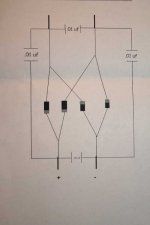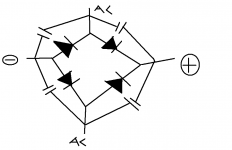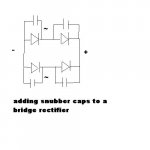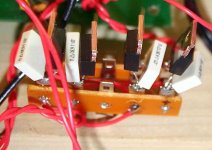folks
i installed superfast hexfred diodes in my amp and
there is big improvments in the transients but
sometimes i notice some harshiness in the top end.
if anyone had the same experience????????????????????
thank you
richt
i installed superfast hexfred diodes in my amp and
there is big improvments in the transients but
sometimes i notice some harshiness in the top end.
if anyone had the same experience????????????????????
thank you
richt
I have researched (theoretically only, no listening tests yet) diodes and have decided to standardize on IRF 15ETH06 http://www.irf.com/whats-new/nr001005.html (For low voltage stuff I expect I will standardize on a shottky). The unit is marketed as "Hyperfast" and "very soft-recovery". A noble marketing message if ever there was one + the datasheet looks nice.
These units are 600V which is more than adequate for my needs. Higher voltage units are available in similar series, but this particular model is quite new.
My philosophy at this point is to check out the data sheets and make an informed decision. Your mileage may vary.
Petter
These units are 600V which is more than adequate for my needs. Higher voltage units are available in similar series, but this particular model is quite new.
My philosophy at this point is to check out the data sheets and make an informed decision. Your mileage may vary.
Petter
Hyper fasts are the go!
My friend can't stop raving about these rectifiers...one of the cheapest places to get them is www.future-active.com although MOQs are usually 50. Get a few friends together and go for it. I had enough gumption to just put an order through myself...
He was using the RHRG3060s and similar types.
From their website:
1. Mfr. Part #: RHRG3060
Future Part #: RHRG3060
Vendor: FAIRCHILD
Package Qty: 30
In Stock
View Similar Parts 30 - 90: 1.254
120 - 150: 1.199
180 - 210: 1.177
240 - 270: 1.155
300+: 1.134
Dirt cheap:
My friend can't stop raving about these rectifiers...one of the cheapest places to get them is www.future-active.com although MOQs are usually 50. Get a few friends together and go for it. I had enough gumption to just put an order through myself...
He was using the RHRG3060s and similar types.
From their website:
1. Mfr. Part #: RHRG3060
Future Part #: RHRG3060
Vendor: FAIRCHILD
Package Qty: 30
In Stock
View Similar Parts 30 - 90: 1.254
120 - 150: 1.199
180 - 210: 1.177
240 - 270: 1.155
300+: 1.134
Dirt cheap:

I finally did some diode comparison tests yesterday and here's what I found: http://www.diyaudio.com/forums/showthread.php?s=&postid=134303#post134303
Basically my findings about hexfreds are confirmed with the above comments.
Basically my findings about hexfreds are confirmed with the above comments.
-----------------------------------richt said:folks
i installed superfast hexfred diodes in my amp and
there is big improvments in the transients but
sometimes i notice some harshiness in the top end.
if anyone had the same experience????????????????????
thank you
richt
Have a look at the wave form using a wide band say 100MHz scope and see if you have a nive traingular shape, or if there ia a lot of hf hash. In that case try a snubber cap.,0.01uf across eaxh diode. Pl post your findings.
diode and cap placement
Hello Richt; Could you please sketch a diagram of what you mean by ".01 cap across each diode"? I am having a difficult time trying to conceptualize this in my stressed out brain. Would you do this for each diode if you were making a full wave bridge?
Thanks, Andy
Hello Richt; Could you please sketch a diagram of what you mean by ".01 cap across each diode"? I am having a difficult time trying to conceptualize this in my stressed out brain. Would you do this for each diode if you were making a full wave bridge?
Thanks, Andy
put each cap in parallel with each diode is what he meant. this reduces the RF noise generated by the diodes. for a bridge rectifier, this would require 4 0.1uf caps.
no,
you have paralleled two of the diodes with caps, but not the other two.
You should also experiment with adding resistors in series with each cap to create a real snubber (damped RC) rather than rely on the very low ESR that is inherent in some caps.
you have paralleled two of the diodes with caps, but not the other two.
You should also experiment with adding resistors in series with each cap to create a real snubber (damped RC) rather than rely on the very low ESR that is inherent in some caps.
Yeah, I still don't know how to wire them. Could someone make a crude drawing, snap a picture of it and upload it here? This would greatly eliminate confusion for me.
Thanks for all of the excellent help!
Andy
Thanks for all of the excellent help!
Andy
Wow! Thank you for the schematic. It really makes sense!
I can't stress how thankful I am!
Sincerely,
Andy
I can't stress how thankful I am!
Sincerely,
Andy
Cool guys!! I did a nice point to point job with 4 hexfreds and 4 .01 caps. I'm listening to it right now and the results (with complete thanks to you all!) and it is simply amazing.
This has been a truly amazing learning experience. And I only went through three fuses this time!
Sincerely,
Andy
This has been a truly amazing learning experience. And I only went through three fuses this time!
Sincerely,
Andy
Attachments
if you blew any fuses then you forgot to take your bulb tester off the shelf and use it for this modification.durkla18 said:And I only went through three fuses this time!
Jon, The snubbers are not required when building a diode bridge. However, what I have read on here is that the snubbers help eliminate some of the diode switching noise.
I actually built two sets of diode bridges from the schematics above. One without the snubbers installed and the other with the snubbers attached. This way I can easily compare/contrast the diode bridges.
I haven't really decided which one I like better, since they both sound pretty good, plus they were built last night.
Perhaps you should do the same and experiment, so your ears can decide what arrangement sounds better to you.
I hope that this suggestion helps you with your project.
Sincerely,
Andy
I actually built two sets of diode bridges from the schematics above. One without the snubbers installed and the other with the snubbers attached. This way I can easily compare/contrast the diode bridges.
I haven't really decided which one I like better, since they both sound pretty good, plus they were built last night.
Perhaps you should do the same and experiment, so your ears can decide what arrangement sounds better to you.
I hope that this suggestion helps you with your project.
Sincerely,
Andy
Hi Andy,
Thanks for your reply. I agree with what you say about listening.
From a technical viewpoint I understand that the snubber is there to suppress the ringing caused by the LC tank circuit formed by the leakage inductance of the transformer and the capacitance (stored charge) of the diode during the period when the diode switches off. Schottky diodes supposedly have no recovery time so the snubber shouldn't be necessary (?). Also fitting a C or RC across the diode provides a new path for HF into your circuit . Another and perhaps better option therefore would be to fit an RC across the transformer and leave the diodes alone. Is there some disadvantage to using schottky diodes ?
. Another and perhaps better option therefore would be to fit an RC across the transformer and leave the diodes alone. Is there some disadvantage to using schottky diodes ?
Cheers,
Jon
Thanks for your reply. I agree with what you say about listening.
From a technical viewpoint I understand that the snubber is there to suppress the ringing caused by the LC tank circuit formed by the leakage inductance of the transformer and the capacitance (stored charge) of the diode during the period when the diode switches off. Schottky diodes supposedly have no recovery time so the snubber shouldn't be necessary (?). Also fitting a C or RC across the diode provides a new path for HF into your circuit
 . Another and perhaps better option therefore would be to fit an RC across the transformer and leave the diodes alone. Is there some disadvantage to using schottky diodes ?
. Another and perhaps better option therefore would be to fit an RC across the transformer and leave the diodes alone. Is there some disadvantage to using schottky diodes ?Cheers,
Jon
JonHarrison said:
Is there some disadvantage to using schottky diodes ?
I would really apreciate a comment on this as I am deciding what to use in my new pre amp.
schottkys or hexfreds + snubbers ?
Ricardo
- Status
- Not open for further replies.
- Home
- Amplifiers
- Solid State
- hexfreds vs. regs diodes



